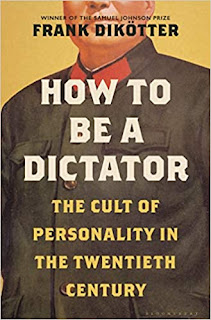How to Be a Dictator
How to be a Dictator: The Cult of Personality in the Twentieth Century, by Frank Dikötter
I found this title pretty hard to resist! Many of the people in this book (though not all) are very familiar; Dikötter takes us on a selective tour of dictators of the 20th century -- specifically those who fostered a cult of personality -- starting with Mussolini. Of course Stalin, Hitler, and Mao are included, but Dikötter keeps the focus just on the personality cult, which means that I learned quite a bit even though I'm pretty familiar with those guys.
After that, we take a turn into lesser-known dictators: Kim Il-Sung (North Korea), Duvalier (Haiti), Ceaușescu (Romania), and Mengistu (Ethiopia). These were fascinating. Most of them were not as adept or as focused as the Big Four (that's an Agatha Christie joke for you, sorry). Some were Communist or Fascist, and some just plain dictators; they all felt the need to have a self-named philosophy and published works, but those rarely made any sense.
I had never realized before that Duvalier was known as Papa Doc because he actually was a doctor; he'd started off working in rural clinics. And I didn't really know anything about Mengistu, except that he came after Emperor Haile Selassie (who, my goodness, lasted a long time!). It was no surprise to learn that the Ethiopian famine was mostly the result of politics, much less than the drought, which exacerbated the problems that already existed.
I know a bit more about Ceaușescu, because I was living in Denmark in 1989 when the Iron Curtain collapsed, and my host dad and I would watch the news. I clearly remember seeing the famous blood-spattered wall where the Ceaușescus were shot, and have read a bit about his brutal regime.
The main takeaways from this, I thought, were:
- Strong-man politics is even worse than I thought. There is no such thing as a single Great Leader who will lead his people into a glorious new era. Believing in a Great Leader is a seductive trap that lulls us into thinking we don't have to work to hold up and benefit our communities; somebody else will do it for us. Nope. In order to be free, we must also be responsible, educated, and hard-working citizens.
- Dictators surround themselves with ever-more-obsequious toady types, and develop ever less tolerance for disagreement or tolerance of any kind. Paranoia is inevitable, and in the end -- loss of mental balance. Apparently the human mind isn't really equipped to be all-powerful and will break down under the illusion that it is.
An excellent and fascinating book, chronicling history that we forget at our peril.
Mussolini and Hitler are shown as, at first, a mutual admiration club, but that very soon soured into intense envy and rivalry, as they each tried to out-do the other in pomp, power, and general show-offiness. It reminded me irresistibly of a kids' show we used to watch. (I think Oobi was a great, underappreciated show!) There was this episode where Oobi and his best friend Kako build forts and find out that competing over who has the best fort isn't very fun -- I include a short clip here. Oobi and Kako show a bit more maturity than Mussolini and Hitler ever did.






great book and a great post!
ReplyDeleteThis sounds super interesting! I have another book on my TBR list that perhaps treads some of the same ground, called (I think) The Dictator's Handbook, and I bet it would be a neat pairing to read them both together.
ReplyDeleteOoo, yes, that would be great!
DeleteI've been very curious about the book--sounds like it's definitely worth hunting up. Thanks!
ReplyDeleteYes, I think it is!
DeleteVery thought provoking. To bear in mind: "Apparently the human mind isn't really equipped to be all-powerful and will break down under the illusion that it is." Why is this so hard for us to grasp? In small ways we're each tempted to be the dictator of our personal lives, we have to learn humility and interdependence and not go the route of these sadly unbalanced individuals. Much to learn.
ReplyDeleteYou are so right, Lory!
DeleteI'm so reading this! Thanks!
ReplyDelete